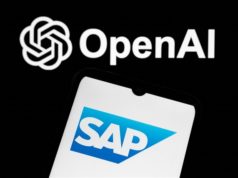Compuware has made a series of moves to bring DevOps front and center for enterprises that depend on the mainframe.
Mainframe software maker Compuware has announced a series of moves to help enterprises bring the mainframe further into the DevOps fold.
Compuware announced the availability of new REST APIs for ISPW, a popular agile source code management and release automation solution that it acquired in January. These APIs enable organizations to integrate their mainframe and non-mainframe DevOps tools with ISPW to create DevOps tool chains, said Chris O’Malley, CEO of Compuware.
“Over the last seven quarters we’ve become a DevOps company and we made all these aggressive promises that on the first business day of every quarter we would come out with all of these new capabilities and updates to our existing or classic offerings and integration with our DevOps tool chain,” O’Malley told eWEEK in a previous interview.
He noted that enterprises are moving to DevOps for the agility it affords them. Bringing developers and operations staff together in the process of building software is beneficial because traditional mainframe development, test and coding processes are too slow to turn out software according to the demands of today’s software development teams. Moreover, because mainframe applications and data are typically in back-end systems for front-end web and mobile systems, DevOps has to run across all platforms, O’Malley said.
“As our business increasingly depends on software, we have to be able to get more software of higher quality into production faster at less cost,” said Simon Hu senior advisor for mainframe delivery for AARP, in a statement. “Technologies such as ISPW and Topaz that help streamline our DevOps processes and make them more agile are thus of greater business value to us than ever.”
Compuware said there is no expertise in mainframe technology required to use the APIs. For instance, the new Promote Release and Deploy Release APIs support Webhook notification, Compuware said. And use-cases include integration with popular Agile and DevOps tools such as Jenkins, Slack, HipChat and XebiaLabs’ XL Release.
“To fully support the end-to-end software lifecycles so essential to digital efforts, mainframe development and deployment must move faster and integrate seamlessly into the rest of the digital enterprise,” said Jason Bloomberg an analyst with Intellyx, in a statement. “By implementing RESTful API-based integration in ISPW, Compuware has elevated mainframe dev and test tooling to full participants in modern DevOps toolchains.”
Following its January acquisition of ISPW, in April Compuware introduced integration of ISPW with Compuware’s Topaz Workbench mainframe development platform. Then in July, Compuware delivered ISPW Deploy, which is a release automation solution for IBM z/OS environments built on ISPW technology.
“Enterprise IT leaders desperately want to transform the way they do software development, testing, promotion and ongoing management on their mainframes, but their incumbent vendors have almost universally chosen to abandon much-needed product innovation—and to instead exploit their captive customer bases for maximum profit,” O’Malley said in a statement.”By delivering Web APIs for an Agile mainframe solution that we acquired a mere nine months ago, Compuware is once again proving that we are the only mainframe software partner ready, willing and able to help customers compete at digital speed and with digital excellence.”
In addition to the new APIs, Compuware also announced several new enhancements to its Topaz Workbench integrated development environment (IDE) for mainframe DevOps. The enhancements make it easier for non-mainframe experts to work on the z/OS platform. Specifically, the enhancements include direct access to File-AID Compare within Topaz Workbench so developers can more quickly and accurately understand differences between data files. The new release also provides built-in support for Dynamic Transaction Routing for CICSPLEX sites that use Xpediter for application debugging.
“Customers are trying to move, as time goes on, away from things like waterfall development methodologies into Agile,” O’Malley said. “And they’re trying to create a culture that’s not siloed to these different platforms – a mainframe culture, a distributed culture, a mobile culture; they want just one culture. They want one Agile set of processes regardless of platform and they want one set of tools regardless of platform.”




